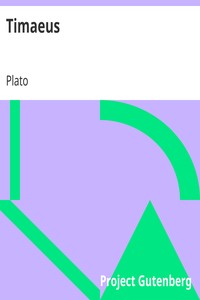Timaeus by Plato
"Timaeus" by Plato is a philosophical dialogue most likely written in the 4th century BC. It is a foundational text of Western philosophy, exploring themes of cosmology, metaphysics, and the nature of the universe. Within the dialogue, the character Timaeus presents theories about the creation of the world, the nature of its elements, and the role of the divine craftsman in shaping reality. The opening of "Timaeus" sets the stage for a
complex exploration of these philosophical concepts. It begins with Socrates’ reflections on the ideal state of humanity and ultimately leads to Timaeus giving a detailed account of the universe's creation, discussing topics such as the nature of being, the elements of the cosmos, and the divine order behind them. The discussion is interspersed with references to ancient myths, specifically the tale of Atlantis as recounted by Critias, which adds a historical and narrative layer to the philosophical discourse. The introduction also highlights the mixed blend of science and spirituality, as Plato navigates through obscure notions and celestial formations, asserting that understanding the cosmos requires both reason and an acknowledgment of its underlying divine harmony. (This is an automatically generated summary.)
Read or download for free
| How to read | Url | Size | |||
|---|---|---|---|---|---|
| Read now! | https://www.gutenberg.org/ebooks/1572.html.images | 470 kB | |||
| EPUB3 (E-readers incl. Send-to-Kindle) | https://www.gutenberg.org/ebooks/1572.epub3.images | 216 kB | |||
| EPUB (older E-readers) | https://www.gutenberg.org/ebooks/1572.epub.images | 222 kB | |||
| Kindle | https://www.gutenberg.org/ebooks/1572.kf8.images | 361 kB | |||
| older Kindles | https://www.gutenberg.org/ebooks/1572.kindle.images | 337 kB | |||
| Plain Text UTF-8 | https://www.gutenberg.org/ebooks/1572.txt.utf-8 | 465 kB | |||
| Download HTML (zip) | https://www.gutenberg.org/cache/epub/1572/pg1572-h.zip | 210 kB | |||
| There may be more files related to this item. | |||||
Similar Books
About this eBook
| Author | Plato, 428? BCE-348? BCE |
|---|---|
| Translator | Jowett, Benjamin, 1817-1893 |
| Title | Timaeus |
| Note | Wikipedia page about this book: https://en.wikipedia.org/wiki/Timaeus_(dialogue) |
| Note | Reading ease score: 54.1 (10th to 12th grade). Somewhat difficult to read. |
| Credits | Sue Asscher and David Widger |
| Language | English |
| LoC Class | B: Philosophy, Psychology, Religion |
| LoC Class | PA: Language and Literatures: Classical Languages and Literature |
| Subject | Classical literature |
| Subject | Cosmology -- Early works to 1800 |
| Category | Text |
| EBook-No. | 1572 |
| Release Date | Dec 1, 1998 |
| Most Recently Updated | Apr 25, 2021 |
| Copyright Status | Public domain in the USA. |
| Downloads | 1912 downloads in the last 30 days. |
| Project Gutenberg eBooks are always free! | |


